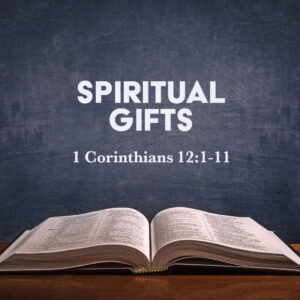1 Corinthians 12:1-11: Spiritual Gifts
April 18, 2023
TODAY'S BIBLE READING:
Judges 13-15, Psalm 88, Mark 7:1-23, 1 Corinthians 12:1-13

I’m going to divert from the suggested breaking of the passage in today’s Bible reading and comment on verses 1 to 11 (and then tomorrow verses 12 to the end of the chapter)!
In the first three verses of this chapter, Paul wants to give them a test for determining whether a particular spirituality is really from God or not. At first glance, the test he provides seems almost risibly simplistic: “No one can say Jesus is Lord except by the Holy Spirit.” Surely, someone can just say “Jesus is Lord” and not really mean it? And even if they do mean it, surely church history attests to the many hidden doctrinal rocks that can lie beneath the apparent smooth sailing of the bold confession that “Jesus is Lord”?
It is important then to understand the context. In those days, with growing potential for persecution from the Roman state, to affirm that Jesus (not Caesar) was Lord was a risky proposition. It was not a litmus test, as such, but it was a good guide to whether someone was really and truly committed to Christ. Were they willing to risk their lives by publicly attesting their faith in Jesus as their Lord? If so, then you can be sure that the Spirit of God was at work in them—much as if someone were told to deny Christ or burn at the stake, and they choose to burn at the stake rather than deny Christ, you have a pretty good guide that they truly are a Christian.
But there is more to it even than that. The confession “Jesus is Lord” is not only a signal solo statement, it is also the principle from which all truly orthodox Christian theology stems. He is risen. He is Lord. The kingship of Jesus. The divinity of Jesus. If someone genuinely believes this and thinks consistently with this and practices in conformity with this—well, then, the Spirit of God is certainly at work in them.
That said, later confessions have developed more complexity, and rightly so. When new heresies come along—finding more clever ways to deny that Jesus is Lord—it is necessary for the church to specify in what way they believe he is Lord, which leads to longer and more complicated creeds. The principle that is established here is that spirituality, the spiritual gifts, cannot be divorced from orthodox Christian doctrine.
From the next paragraph, verse 4 and on, we then move to a description of the beautiful orchestra of the spiritual gifts working together in harmony. The same God. The same Spirit. Distributing the gifts as he determines. Working together for one great end—the beautiful display of the glory of God in the gospel. What a vision! And how much then we should be, first, grateful for the spiritual gifts which God has given. And seek to exercise our spiritual gifts in conformity to the purpose of united witness and edification of the whole body of Christ.
ABOUT THE AUTHOR
Josh Moody (Ph.D., University of Cambridge) is the senior pastor of College Church in Wheaton, IL., president and founder of God Centered Life Ministries, and author of several books including How the Bible Can Change Your Life and John 1-12 For You.
WANT MORE?
To receive God Centered Life devotionals directly in your inbox, as well as other resources, enter your email address in the form at the bottom of this page and click "subscribe."

